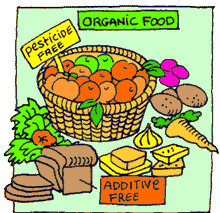Organic is the newest fad in being green and healthy. It is available in most every supermarket and we see the USDA green seal almost everywhere. Many people believe that organic food is healthier for you, when in fact, many people question its overall nutritional value compared to other food grown in conventional methods. So what is the real deal with organic food?
We see the green seal and hear all the talk about organic products, but what actually does it mean to be organically grown?
- no pesticides
- no insecticides
- no fertilizers
- no ionizing radiation
- Animals are not given growth hormones
- Approved by certified USDA employees
Aka organic food is natural. Do you really want all those things on your apple and in your salad?
The debate about organic vs. Non organic is ongoing in the media daily. According to an article in the Sunday Times and Redbook Magazine there are many arguments for and against buying organic products.
Go Organic!
- Organic farms pollute less
- Pesticides can be cancer causing
- Farmers can become sick from chemicals used in conventional farming methods
- May have higher nutritional value because of the absence of certain pesticides
Don’t Go Organic!
- Organic food is more expensive up to 50% more expensive than conventionally grown crops
- Organic food cannot feed the world
- Better technology does allow conventional farmers to be more green and use less land for growing food
- Organic food is not necessarily better for you
Organic products have grown to become quite popular all around the country. According to the United States Department of Agriculture, consumer demand for organically grown food has shown significant growth for over a decade. Here are some recent trends concerning organic food sales in the U.S.
- Organic is now available in over 20,000 natural food stores
- Organic products are available in 3 out of 4 conventional grocery stores
- Organic sales account for about 3% of food sales
- About 70% of people buy organic food occasionally
The choice to go organic is yours alone. If you can afford to buy organic food, experts recommend doing so. If not the Environmental Working Group recommends buying the “dirty dozen:” peaches, strawberries, cherries, potatoes, lettuce, imported grapes, along with other assorted fruits and veggies. Look for the USDA green seal when shopping for organic products. Happy Eating!
